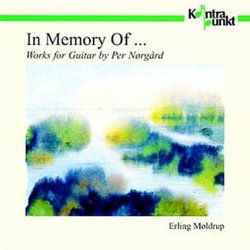| All Artists: Erling Mldrup Title: In Memory Of ... Members Wishing: 0 Total Copies: 0 Label: Kontrapunkt Original Release Date: 1/1/2005 Re-Release Date: 1/1/2010 Album Type: Import Genre: Classical Styles: Chamber Music, Historical Periods, Classical (c.1770-1830), Instruments, Strings Number of Discs: 1 SwapaCD Credits: 1 UPC: 716043224029 |
Search - Erling Mldrup :: In Memory Of ...
 | Erling Mldrup In Memory Of ... Genre: Classical
|
Larger Image |
CD Details |
CD ReviewsNorgard weds the guitar's old traditions to his own stylisti Christopher Culver | 04/05/2009 (3 out of 5 stars) "Among the 400-odd pieces that the Danish composer Per Norgard has written, we find a number of works for solo guitar, very often related to the unique stylistic and technical explorations of the era in which they were written. On this Kontrapunkt disc, the composer's friend and favourite guitarist Erling Moldrup performs several of these.
There's a 12-minute solo guitar extract here from Norgard's work "Libra" (1973). "Libra" is one of those important Norgard pieces that frustratingly isn't easily available in recording. It is a vast 10-movement work for tenor solo, guitar, 4-part choir, 4-part a cappella choir, supporting woodwinds, and 2 vibraphones (or pianos, or harps) where voices ecstatically sing Rudolf Steiner's poem "Die Welten erhalten Welten" and the psalms of David. The guitar music, however, is pretty unimpressive on its own. We hear some work with the infinity series, and some weird undulating bits similar to Norgard's "Turn" for piano of the same year, but I rarely return to this work. "Returns" for guitar solo (1976) was written at the height of Norgard's hierarchical phase, with the entire musical content selected strands from the great weave of the infinity series. The line continually comes back to a basic little melodic figure, hence the title, though it explores many different moods from this base. "Returns" is the first Norgard work most guitarists learn, and it works well as a path into the guitar oeuvre for mere listeners as well. "Mating Dance" for flute and guitar (1977) is closely related, retaining the very same guitar line from "Returns", but plugging the flute part into its hierarchial possibilities. The result sounds less like Norgard's other infinity series works and more like Wyndham Hill label musings, but this is really a remarkable achievement when one considers how such a strict process has been subjugated to an interest in frisky melody. "In Memory of..." (1978) is exceedingly simple in its musical material, being a set of limited variations on a more or less coherent theme. However, Norgard explores a wider range of guitar techniques here than on previous works. "Papalagi" (1981) is written for guitar, but there is also a part for woodblock or metronome. The woodblock keeps constant time at certain parts, but the guitarist feels torn between conformity with this fixed tempo or his own natural flexibility as a performer. The title is taken from Erich Scheurmann's supposed recollections of a Samoan chief (first Carlos Castaneda inspires "Twilight" and now this, poor Norgard keeps being taken in by anthropological hoaxes). There are two scenes here from Norgard's hour-long guitar suite "Tales for a Hand". In the late 1980s and early 1990s Norgard found inspiration in the symbols of playing cards. The first, "In the Mood of Spades", begins with gloomy pomp (the King), shifts to a sort of indecisiveness (the Queen), and then sort of combines the two (the Ace). These are supposed to be three distinct movements, but Kontrapunkt has unfortunately put them all on the same CD track. The idea here is the very same as in Norgard's first harp concerto "King, Queen and Ace", and I found that a more memorable treatment. The second scene of "Tales from a Hand", "The Lady of Hearts", consists of much more gentle rhythms, with references to the Baroque era and Nordic folk music. Moldrup recorded the entire suite on a Classico disc released in 2007. Except for "Returns", none of this strikes me as among Norgard's best work. However, I'm not that big a fan of guitar repertoire, and I feel that Norgard's interest in the whole classical guitar tradition is so strong that it lessens his unique voice. But if you dig classical guitar than this might be a wonderful disc for you, as Norgard is one of the few modern composers so concerned with the instrument." |

 Track Listings (7) - Disc #1
Track Listings (7) - Disc #1